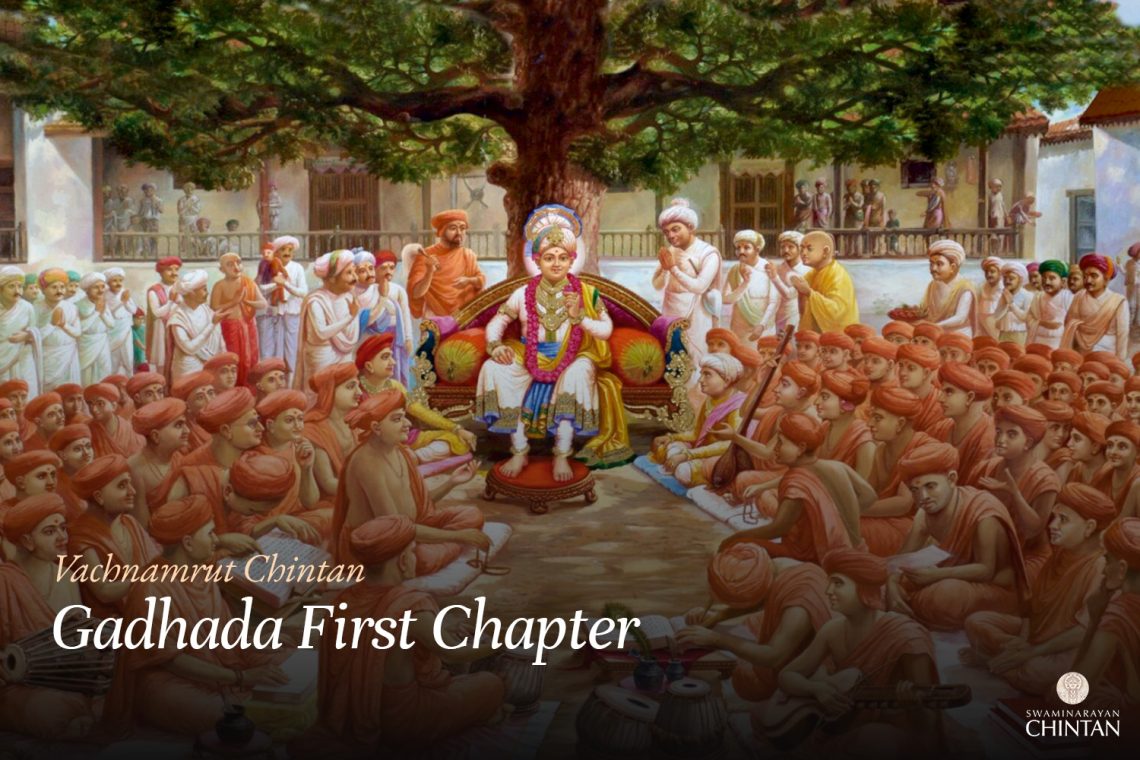Central Insights:
- Comparison between a detached devotee and a service-oriented devotee.
- Characteristics of a devotee and an evil person.
- The virtue of adopting positive traits from God and His devotees, and the vice of adopting their perceived flaws.
Key Points:
- The one who serves God and His saints is esteemed, whereas the one who cannot is akin to being powerless.
- Those with malicious intent (evil intelligence) consistently harbor negative perspectives.
Explanation
The Vachanāmrut juxtaposes two types of devotees, emphasizing the superiority of service-oriented ones. Serving God and His saints is a path to salvation. Another such path is not betraying or causing harm to anyone, especially God’s devotees. While both paths are beneficial, conflicts sometimes arise between them. For instance, during service, one might inadvertently upset another, possibly using harsh words. This could be seen as a betrayal or harm, thus opposing the second path. Yet, both principles are vital in the journey of salvation, with the act of service being paramount.
When a conflict arises between these two paths, a seeker (Mumukshu) often faces a dilemma. Maharaj clarifies this intricacy, highlighting the importance of maintaining both. However, in times of conflict, service should remain undisturbed, as it is primary.
The next focus is understanding the evil mindset, which prompts the question: Who is a devotee and who is evil-minded? To delve into these questions, consider the following options:
- Someone who perceives virtues in God, His devotees, and even non-devotees. They always see the good in all. Such a person appreciates virtues but isn’t necessarily a devotee.
- One who perceives virtues only in God and His devotees is a true devotee.
- One who perceives flaws solely in God and His devotees, but not in others, is purely malicious (Demonic Mindset).
- One who finds flaws in God, His devotees, and everyone else is negative but not purely malicious (Demonic Mindset).
At a glance, one might assume that the first option describes a devotee and the last an evil person. But the Vachanāmrut uses Shishupal as an example that aligns more with the third option. Shishupal found flaws not in everyone but specifically in Bhagwan Krishna and the Pandavas, despite being close to others like Jarāsandh and Duryodhan, who had their own shortcomings. Shishupal’s target was the Pandavas because they were God’s devotees, manifesting an evil mindset that finds faults in God and His devotees.
Thus, a true devotee perceives virtues in God and His devotees. While a gracious person might see the good in everyone, only one who sees virtues primarily in God and His devotees can be termed a devotee.
The central idea is to differentiate between a devotee and an evil-minded individual, rather than deeply analyzing each option. Importantly, this doesn’t imply that devotees shouldn’t adopt virtues from non-devotees. Embracing virtues from all enhances one’s character and reputation.
The answer to this is that the Pandavas are devout. His name is demonic intelligence, which sees only flaws in the devout. To perceive faults only in the devout and everywhere else is definitely a flawed vision; but it is not influenced by a demonic attitude. It is not suggested that this is good. There is undoubtedly negativity, but it is not immediately demonic. The immediate demonic trait is to see only flaws in the devout.
Reversing this thought, a devotee is also the one who sees virtues only in the devotees (i.e., in God and God’s devotees). If one sees virtues everywhere, it is civility, it is gentility, it is nobility; there is a broad-mindedness but it does not necessarily carry the title of devotee. Devotion will be categorized differently.
One thing to keep in mind here is that our primary focus is not to compare the first and second, third and fourth options. What are devotion and demonic intelligence? The clarity of this is the aim. It is beneficial to understand this. Otherwise, there will be a misunderstanding or undervaluation about devotion. But that doesn’t mean that a devotee should not appreciate the qualities of others. If they do, it is their grace, generosity, and desirable.
Glossary
| Broad-Mindedness – The ability to overlook minor faults and see the larger truth This quality helps a devotee focus on God’s greatness rather than being distracted by superficial actions or behavior that may appear questionable outwardly. |
| Civility – Respectful and polite behavior Even if someone sees a fault, maintaining respect and politeness toward God and saints is essential; disrespect is condemned regardless of the reason. |
| Demonic Intelligence – A mindset that sees faults in God and saints This type of intelligence focuses on the external actions or faults of God and devotees, and mocks or disrespects them, leading to spiritual downfall. |
| Devotee – A follower devoted to Bhagwan A person who is fully committed to Bhagwan, surrendering to His will, and practicing devotion to Him. |
| Mumukshu – Seeker of liberation (Moksha) |
| Nishchay – Firm Faith in Manifested God Believing Manifested God (Bhagwan Swaminarayan) as “My Beloved God” (My Istadev) |
| Pandavas – Devotees of God who saw only virtues in Him They are highlighted as spiritually elevated beings who remained devoted and respectful toward God, never seeing any fault in His actions. |
| Shishupal – A character who constantly found faults in God He repeatedly criticized and insulted God despite knowing His greatness, and is given as an example of someone with demonic intelligence in this Vachanamrut. |

